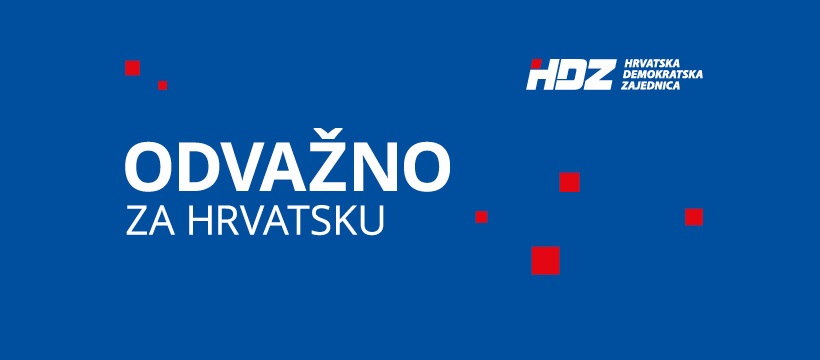Demographic Revitalisation Remains Strategic Issue, Prime Minister Says
4 April 2022 - Demographic revitalisation remains a strategic issue of Croatia's future and all actors must cooperate in this long-term project, from the national and local governments to civil society and the business sector, Prime Minister Andrej Plenković said on Monday.
Speaking at an Economic and Social Council session, he said the Croatian Bureau of Statistics was still processing the results of last year's census but that they led to the conclusion that everyone would have to work together on more effective public policies that would contribute to turning the negative population trends around.
"We wish to create a positive social climate for starting and expanding a family, better care for children and our older citizens, because a demographically more vital Croatia is the only solution to the future of the Croatian people," the prime minister said.
That requires the synergy of the state, municipalities, towns, counties, civil society, the social partners, the academic community and the business sector because it is an issue on which it is easiest to reach a broad national consensus, he added.
Croatia's population began decreasing in 1991 as a consequence of the war, emigration, ageing and fewer births, but other EU member states have the same problems, he said.
The government is taking measures for youth, families and other social and economic actors via population, tax, social, housing, education, employment and other policies.
Plenković said a national reform programme would comprise 95 reforms in six areas - the economy; public administration and the judiciary; education, science and research; the labour market and welfare; health; and building reconstruction and energy efficiency.
He mentioned challenges such as climate change, energy efficiency, the crackdown on corruption, stronger administration, a modern education system, helping those most in need, and promoting healthy lifestyles and disease prevention.
Plenković also mentioned the government's activities to boost the economy and mitigate the blow of the crisis to living standards.
Croatia Emigrants Dismiss Incentive: Money Not Enough, Change Mindset
March 10, 2020 - There isn’t any amount money that would lure us back to Croatia, according to emigrants who responded to Prime Minister Plenković's recent financial incentive proposal to encourage their return. Croatian politicians and PM Andrej Plenković are clearly not listening to what emigrants are saying. Money is not the only reason they left, and it’s not even the main reason.

Uhljeb | Facebook
Croatia Mindset Must Change by 300 Percent
The mindset would have to change by 300 percent me to return to Croatia, explained a Zagreb man to Anamarija Burazer/24 Sata on March 10, 2020. He moved with his family to Cork, Ireland a few years ago. Upon being asked why they had moved out, he responded:
“I left because of the bunch of uhljebi (incompetent public sector employees) who are fed by the private sector so they can play solitaire. Then they release pedophiles and murderers while punishing grandmothers for cooking brandy. Politicians are working only for themselves and their own seats and citizens in Croatia feel like second-class citizens…"
In 2018, 24 Sata published the stories of several emigrants, all of whom who have sought happiness throughout the globe. However, they all agree about one thing: they have escaped injustice.
Considering that Prime Minister Andrej Plenkovic just announced financial incentive measures to encourage Croatians to return home; 24 Sata checked in with several interviewees for the two-year-old series regarding the Prime Minister’s proposed incentives.

Domagoj Starcević | Facebook
Employees Have More Rights in Germany
“I have no plans to return to Croatia, and it’s unfortunate that I have more rights as an employee in Germany than I do as an employee in my own country,” Domagoj Starcević (29) reveals. He has lived in Munich for five years and is working as a chef. He still recommends that Croatians who are considering moving away do so.
“For me to return, they would have to offer me a job with two days off per week, a higher salary which is fully reported, and a guaranteed paycheck on the same day of every month,” he added.
Emigrants Find Work, Friends, Purpose Abroad
Since 2016, chemistry engineer Matea Večeric (27) has been living in faraway Japan.
“I would not go back, because once you find your place under the sun and a purpose, a life goal and create a circle of people around you that make you happy, there is nothing anyone can offer to lure me back. If I had had that from the beginning in Croatia, I might not have left,” Matea pointed out. The only thing that could bring her home is her family.
"For now, I continue on my path here in Japan,” she said and reports that she earns three times more in Japan than she did in her home country.
“There are many more opportunities to move forward and live stress-free,” Matea concluded.
Working to Live, Rather Than Survive
Zagreb's Sara Tešanović (30) moved to Germany three years ago with her boyfriend. There, she says, they work to live. In Croatia, they worked to survive.
“Whatever the Prime Minister and other politicians offer us will not provide a sufficient reason to return. It's not about money, it's about the whole situation. So, I wouldn't go back and there is nothing that these people can offer me to come back to,” Sara states decisively.
Andrea Simunović (26) also moved out of Croatia and he believes that the announcement of Prime Minister Plenkovic is just a new election trick.
"I don't think anyone will come back for that," she said.
Josip Aladrović
Government: No Details on Financial Incentive Plan
Labor and Pension Minister Josip Aladrović says that Croatia has implemented new employment measures since the beginning of the year. He did not explain how he intended to stimulate the return of Croatian emigrants.
There is a brick wall in Imotski (home of the recent gay couple effigy burning), with the names of Croatians who have left the country. According to the latest figures: 189,000 people have emigrated from Croatia in the last five years. The emigration has not stopped and there are more and more names on the wall.
Imotski Wall
Follow our Politics page to keep updated on the demographic outlook in Croatia.
Croatia PM Plenkovic Offers Emigrants Money to Return Home
March 10, 2020 – On Sunday evening Croatia Prime Minister Andrej Plenković announced a bold financial incentive to encourage emigrants to return to Croatia from abroad.
“The Ministry of Labour is preparing a new measure – a financial incentive measure for the return of our people who have temporarily gone abroad. We will financially support them to return,” Plenković said at the presentation of his team "Boldly for Croatia" at the HDZ (Croatian Democratic Union) elections in the crowded hall of the Radisson Blu hotel in Split, which was greeted by applause.
HDZ Speeches Frequently Interrupted by Wild Applause
Raucous applause interrupted his speech several times. That was followed by speeches from Toma Medved, candidate for HDZ deputy president and the four candidates for the party's vice-presidents, Zdravka Bušić, Ivan Anušić, Branko Bačić and Oleg Butković. In their speeches, they rejected claims that HDZ had moved to the left and highlighted the success of the government under Plenković's leadership as reported by 24 Sata on March 8, 2020.
“We are six friends, but we are not the same, none of us owe anything to anyone. Nor do we share the same opinions on every topic. However, what connects us is the same vision, the same direction for HDZ and a common program that contains everything that matters to HDZ,” emphasized Plenković.

"Boldly for Croatia" | HDZ
Internal Elections for Sharing Ideas, Not Criticism
The HDZ president urged party members to support his team "Boldly for Croatia" in the elections, stressing the importance of unity in a party which has room for everyone, and for colleagues who are on other teams.
“These internal party elections should be an opportunity to compete about ideas surrounding Croatia's program and vision. They should not be used as an opportunity to criticize one another as if I were listening to and taking arrows from opposition parties. This is not the point of internal party elections. The purpose of internal elections is to maintain appropriate communication within the (party) framework and after which we will continue to cooperate in a normal manner,” said Plenković.
We Are Stronger as United Party
He stressed that the HDZ unity is important in the upcoming parliamentary elections because, he recalled, whenever HDZ is unified – they have success. And when they are not united – the party is in trouble.
“That's why it's important for us to stick together. There is room for everyone, and room for colleagues on other teams who have their own ideas and ambitions - I respect that,” added Plenković.
He noted that the difference is that his team is aware of the government's achievements over the past four years.
Croatia Achieved Sovereign Goals Under Tuđman
He dismissed the remarks of those (right wing) parties who condemn the HDZ's lack of sovereignty and stressed that Croatia had already achieved its sovereign goals under the first Croatian president, Franjo Tuđman. He added that he and his team are following Tuđman's policies.
“It is easy to push irresponsibly for mild populism, to raise passion, and promote falsehoods,” Plenković concluded, dismissing criticism of HDZ’s approach regarding sovereignty.
Follow our Politics page for details on the Prime Minister’s recent financial offer to Croatian emigrants, and their response.
When Will Croatia's Emigration Stop? Experts Weigh In
As Poslovni Dnevnik writes on the 20th of July, 2019, based on economic trends and the number of residents in other transition countries, Croatian economist Velimir Šonje estimates that less developed countries, as well as Croatia can stabilise their number of inhabitants when they reach 80 percent of EU average.
The message from Tao Zhang, the deputy director of the IMF, was that Croatia's region would grow old before it gets richer, ie, before it reaches a certain level of economic development that will provide all of its inhabitants with a decent standard.
Bleak outlooks dominate in almost all of Croatia's demographic forecasts by which the number of older people will be doubled by the middle of the century, and by the end of the century, there will be two retirees for every one working individual, Večernji list writes.
As stated, based on economic trends and the number of residents in other transition countries, Croatian economist Velimir Šonje estimates that less developed countries, as well as Croatia, can manage to stabilise their numbers of inhabitants when they reach 80 percent of EU average. - The Czech Republic, Slovenia and Slovakia, with no particular population decline, are around or above 80 percent of the EU average.
Estonia, which has recently reached that level, had experienced a decline earlier, but it eventually stopped, says Šonje. A researcher from the Vienna Institute, Isolda Mara, came to the conclusion that salary growth resulted in the slowing of certain types of migration. Another conclusion was also drawn, that external mobility from the newer EU member states had slowed down since 2015, and is likely to remain at a lower level in the future.
However, this analyst also points out the fact that it is too early to talk about stronger return migration. 2018 could prove to be a breakthrough year for Croatia, because last year, there was a decrease in emigration and growth in immigration ever since Croatia joined the European Union back in 2013. New Europe is copying Western countries more than those in Croatia realise it is, and they're filling their own labour market gaps with immigration from their less developed, poorer close neighbours.
Even though it makes up part of the group of countries that have managed to reach 80 percent of the average EU GDP, emigration is also still present in neighbouring Slovenia, where this year, according to official information, there are about 40,000 foreigners working there, mostly from Bosnia and Herzegovina and Serbia. Unlike Croatian migrants who raise their anchors and take their entire families with them abroad, Slovenians prefer daily migration and travel to work in Austria or Italy, but continue to ''make their beds'' at home in Slovenia.
''Croatia's tragedy is the fact that it could already be close to 80 percent of EU's average growth. In 2007, Croatia was at 61 percent of the EU average, Poland was at 53 percent, and today Poland is at 71 percent! In the meantime, Croatia has steadily grown two percentage points faster than the EU average, today Croatia could have been at 76 percent instead of at 63 percent,'' said Velimir Šonje, who calculated that Croatia would reach 85 percent of the EU's average development level by 2035, if it continued to grow two percentage points faster than the EU average.
Follow our dedicated politics page for much more.
26,000 Croats Returned to Croatia from Working Abroad Last Year
As Poslovni Dnevnik writes on the 29th of June, 2019, according to unofficial estimates, about 300,000 Croatian citizens have left the Republic of Croatia since 2013, the year that Croatia joined the European Union, the same year that freedom of movement was adopted as part of the EU's four fundamental freedoms for Croatia's access to the single market.
According to official statistics, 2018 will be hopefully remembered as a year during which the growing number of people leaving Croatia to seek work abroad finally slowed down, and an increase in returnees was marked.
As far as returnees are concerned, it will be known in mid-July when the the competent body publishes more detailed data, but according to the first pieces of data available now in Croatia, 26,000 citizens have come from abroad, Večernji list writes.
Despite this, Croatia's migration balance remains negative and the number of those who have left is about 13,000 higher than the number of those who have returned, but the number of citizens leaving the country, which now stands at 39,000, down from 47,000 a year earlier, has obviously decreased. The number of returnees nearly doubled from 15.5 thousand back in 2017, which could mean that the number of people who left the country are beginning to return in larger numbers than they have done over the past six years.
According to unofficial estimates, about 300,000 citizens have left Croatia since 2013, the year which marked the country's accession to the EU. When looking at the last year before Croatia's full EU entry - 2012, about 13,000 citizens migrated from Croatia, and around 9,000 citizens immigrated to the country.
According to international methodology, immigrants from abroad are considered persons who have changed their normal state of residence for a period that is, or is at least expected to be, at least one year. For example, in 2017, about 30,000 citizens moved out of Croatia to Germany, and about three thousand returned.
The number of immigrants from abroad during the year 2018 has been the largest ever since such measurements were conducted, and this includes the approval and issuing of temporary residence permits in Croatia, the list of which Vecernji list received several months ago from the Ministry of the Interior (MUP).
MUP say they approved a temporary residence permits for 43,219 foreigners last year, almost three times more than in 2016, and as a consequence of an increase in Croatia's quota for the employment of foreigners. When it comes to foreigners who were granted temporary residence last year, nearly 80 percent, or 31 thousand of them come from countries that make up the former Yugoslavia - Bosnia and Herzegovina, Serbia, Macedonia, and Kosovo.
For now, it appears that the less educated are attracted to Croatia, as only five percent (about two thousand) are highly qualified. About 28,000 of these foreign residents are under the age of 39, most of whom come from Bosnia and Herzegovina, the citizens of which make up 20,000 of them. Otherwise, work permits are issued for seasonal workers (for third country nationals) for a period of less than a year.
Make sure to follow our dedicated politics and lifestyle page for much more.


